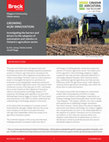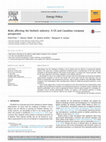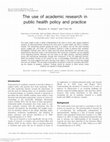Papers by Margaret A Lemay
NCO Policy Brief, 2022
In this policy brief, we present the results of interviews
conducted with stakeholders and partne... more In this policy brief, we present the results of interviews
conducted with stakeholders and partners of Canada’s
Global Innovation Clusters1(GIC, formerly Innovation
Superclusters) on the development and adoption of
automation and robotics technology. The interviews
with the GICs constitute the third phase of a more
extensive four-pronged study to investigate opportunities
and challenges associated with building competitive
production systems in Ontario’s agri-food sector, focusing
on the barriers and drivers associated particularly in the
development and adoption of automation and robotics
technology. We will provide a brief overview of the two
earlier phases to put the present discussion in context.
NCO Working Paper
Data for this report provided by rel8ed.to Analytics. Graphics support for tables and figures pro... more Data for this report provided by rel8ed.to Analytics. Graphics support for tables and figures provided by Kaitlyn Podwinski.

NCO Policy Brief #53, 2021
This policy brief illuminates the opportunities and challenges associated with building competiti... more This policy brief illuminates the opportunities and challenges associated with building competitive production systems in Ontario's agri-food sector, focusing on the issues farmers face in their adoption of automation and robotics technology. The brief is part of a more extensive study 1 to investigate the barriers to, and drivers of, innovation in pursuing globally competitive production systems in Ontario's agriculture sector. The research team conducted a survey in the early part of 2021, canvassing farms across Ontario on their adoption of innovative robotics and automation technology. Based on 171 responses, the findings were reported in our June 2021 Working Paper (Lemay, Boggs, & Conteh, 2021) and raised several questions in our efforts to better understand the underpinnings of technology adoption in the sector. In this policy brief, we endeavour to answer some of those questions through a deeper dive into the survey and an analysis of 36 semi-structured interviews with agri-food stakeholders within the context of an agriculture innovation system. The combined analyses of the survey and interviews challenge prevalent conceptions about the role of

Frontiers in Sustainable Food Systems
This paper reports the findings of an ethnographic study that involved working with local organiz... more This paper reports the findings of an ethnographic study that involved working with local organizations, food advocates, and communities to develop strategies for expanding the nascent Northwest Territories (NWT), Canada agri-food industry. The NWT represents a unique case study in that the fledging agri-food industry has been recognized for its promise in contributing to the core goals of the transitioning NWT food system. The study is guided by two research questions: (1) How is the promise of the emerging NWT agri-food industry framed within the context of the broader food system? (2) Given this framing of the NWT agri-food industry, how can it contribute to the sustainability of the NWT food system and to the goals of food security, poverty reduction, nutrition, and economic development? Grounded in a food systems approach, we used a correlative, evolutionary SWOT analysis to profile the nascent NWT agri-food industry within the context of the existing NWT food system. Through f...

Minvera, 2020
This paper examines the promise of science and its role in shaping research policy. The promise o... more This paper examines the promise of science and its role in shaping research policy. The promise of science is characterized by expectations of science, which are embedded in promissory discourses that envision futures made possible through advances in promising science. Through a single case study of the origins of Genome Canada, the research was guided by the question: How did expectations of genomics shape the creation of Genome Canada? A conceptualization of discursive power and expectations of genomics storylines provide the theoretical and analytical basis for an in-depth examination of the ideational effects and material impacts on research policy decisions over three years (1997–2000) that culminated in the creation of Genome Canada. Expectations of genomics storylines functioned in a complex interplay of discursive practices and dynamics among diverse policy actors within a genomics discourse-coalition to produce a range of ideational and material impacts. The expectations of genomics storylines produced powerful genomics subject-positions from which policy actors perceived their interests, identities and preferences and gained agency, which led to various material impacts, such as mobilizing support and funding, coordinating activities and transforming Canada’s research policy framework. With the increasing importance of research policy to a range of broader policy priorities underpinned by expectations that science will resolve societal challenges and contribute to socio-economic benefits, this paper sheds light on how complex research policy decisions are made; it further contributes to understanding the role of promissory discourses in shaping those decisions.
Evidence & Policy, 2012
Academic research is increasingly linked to a range of socioeconomic benefits. With increasing in... more Academic research is increasingly linked to a range of socioeconomic benefits. With increasing investments in academic research, there is growing pressure to improve the uses of research and demonstrate its impacts. From theoretical and methodological perspectives, the use of research is not well understood. This paper examines the limitations of the widely accepted conventional framework for understanding research use and explores the potential for conceptualising research use as a complex social process. The paper argues that properties and behaviours of complex systems are relevant to building a realistic and more complete understanding of the research use process.

Journal of the Knowledge Economy, 2019
In this study, we draw on Triple/Quadruple/Quintuple Helix theory to analyze differences in perce... more In this study, we draw on Triple/Quadruple/Quintuple Helix theory to analyze differences in perceptions of research outputs between researchers and users in the context of advanced biofuels research-a research environment heavily shaped by social and environmental forces. We present results based on qualitative empirical analysis, presenting the responses of both researchers and research users with regards to the uses of research outputs, users' access to them, and the quality of research outputs. Results show that researchers have a nuanced conceptualization of characteristics that render research outputs useful to private sector users of research outputs, and they show considerable alignment in their assessment with private sector research users. Despite general awareness of policy uses of research, and despite the societal and environmental drivers for research and commercialization of advanced biofuels, these considerations were not as dominant in the assessment of research outputs. Our results imply that further work is needed to integrate the relatively recent concepts of Quadruple/ Quintuple Helix and the underlying considerations of societal and environmental concerns into the practice of knowledge exchanges, and that additional theory and measurement development at the level of analysis of research results would be useful.

Energy Policy, 2016
Risk factors disclosed by 26 publicly traded biofuel companies were analyzed. 22 risks were ident... more Risk factors disclosed by 26 publicly traded biofuel companies were analyzed. 22 risks were identified and assessed. Key risks involved management, market conditions and profitability. A risk focused approach to biofuel policy may support the industry's development. a b s t r a c t Policymakers face the challenge of finding a mix of policies that are effective in growing the biofuels industry. We argue that a missing component of biofuel policy is consideration of the risks faced by companies in the biofuels industry. The purpose of this paper is to address the research question: What are the most important risks facing companies in the biofuels industry? We identify 22 risks in our analysis of 652 narrative risk factor descriptions disclosed by 26 publicly traded biofuel companies in the US and Canada. The results show that the most important risks are related to management and management processes, and to market conditions and profitability. Biofuel companies view technological risks, including those related to intellectual property protection, as less significant. These results suggest that, in order to be responsive to the risks companies face, biofuel policy needs to support the development of managers and management processes; to support market conditions and industry profitability; and to strike an appropriate balance between policy support for technology development and for business development. Further, we suggest a risk informed approach to setting government policy for the biofuels industry may support the industry's development.

Research Evaluation, 2014
This study sought to gain a better understanding of the ways in which users access academic resea... more This study sought to gain a better understanding of the ways in which users access academic research, by observing decision-making at the micro level in a public health unit (PHU) in Ontario, Canada. The overarching question guiding the study is as follows: how do PHU staff members access, engage with, and make use of academic research in order to advance their mandate? Ethnographic methods were used to collect data from direct observations and informant input, augmented by document review. A two-dimensional (2D) continuum of research use was adopted as an organizing heuristic. Research use was shown to be highly dynamic, spanning (spatially) across and transitioning (temporally) through both dimensions of the 2D organizing heuristic. While this research focuses on the context of use, it acknowledges interactions with the other contexts. This study suggests that users may have more 'agency' in the ways in which they engage with and use research. The full range of possibilities discussed is critical for accurately documenting the impacts of academic research. Findings should be relevant to other sectors where research use capacity is being developed.
Book Reviews by Margaret A Lemay
Science and Public Policy, 2018
Canadian Science, Technology and Innovation Policy: The
Innovation Economy and Society Nexus cons... more Canadian Science, Technology and Innovation Policy: The
Innovation Economy and Society Nexus constitutes the
lifetime scholarship and expertise of three of Canada’s
most prominent science policy scholars. Each has made significant
contributions to both the academic field of policy
studies and Canadian science, technology, and innovation
(STI) policy through their ongoing empirical research and
their continuing involvement in STI policy development.
Thesis Chapters by Margaret A Lemay

PhD thesis, 2019
This thesis examines promise of science discourse and its impacts in shaping research policy.Thro... more This thesis examines promise of science discourse and its impacts in shaping research policy.Through a single case study of the origins of Genome Canada, the research was guided by the question: How did expectations of genomics, as promise of genomics discourse, shape the
creation of Genome Canada? Background is presented on the long-standing, but largely unacknowledged, relationship between the promise of science and research policy. Theoretical grounding for the study is provided by concepts from the discursive policy analysis and sociology of expectations of science and technology literatures. Promise of genomics discourse, expectations of genomics of story-lines and a conceptualization of knowledge-based discursive power provide the theoretical and analytical basis for an in-depth examination of the ideational effects and material impacts on research policy decisions over three years (1997 – 2000) that sought to position Canada as a leader, internationally, in genomics research. As discourse, the promise of genomics fulfilled an essential role in shaping policy decisions. The promise of genomics discourse and expectations of genomics story-lines functioned in a complex interplay of discursive practices and dynamics among diverse policy actors within a promise of genomics discourse-coalition to produce a range of ideational and material impacts. The promise of genomics discourse produced powerful promise of genomics subject-positions from which policy
actors perceived their interests, identities and preferences and gained agency, which led to various material impacts, including the transformation of Canada’s research policy framework.
The thesis derives valuable insights about how the diverse policy actors involved in the research policy process perceive and are influenced by the promise of science. With the increasing importance of research policy to a range of broader policy priorities underpinned by expectations
that science will resolve societal challenges and contribute to socio-economic benefits, this thesis sheds light on how complex research policy decisions are made; it further contributes to understanding the processes that lead to those decisions that increasingly must reconcile the relationship between science and society.











Uploads
Papers by Margaret A Lemay
conducted with stakeholders and partners of Canada’s
Global Innovation Clusters1(GIC, formerly Innovation
Superclusters) on the development and adoption of
automation and robotics technology. The interviews
with the GICs constitute the third phase of a more
extensive four-pronged study to investigate opportunities
and challenges associated with building competitive
production systems in Ontario’s agri-food sector, focusing
on the barriers and drivers associated particularly in the
development and adoption of automation and robotics
technology. We will provide a brief overview of the two
earlier phases to put the present discussion in context.
Book Reviews by Margaret A Lemay
Innovation Economy and Society Nexus constitutes the
lifetime scholarship and expertise of three of Canada’s
most prominent science policy scholars. Each has made significant
contributions to both the academic field of policy
studies and Canadian science, technology, and innovation
(STI) policy through their ongoing empirical research and
their continuing involvement in STI policy development.
Thesis Chapters by Margaret A Lemay
creation of Genome Canada? Background is presented on the long-standing, but largely unacknowledged, relationship between the promise of science and research policy. Theoretical grounding for the study is provided by concepts from the discursive policy analysis and sociology of expectations of science and technology literatures. Promise of genomics discourse, expectations of genomics of story-lines and a conceptualization of knowledge-based discursive power provide the theoretical and analytical basis for an in-depth examination of the ideational effects and material impacts on research policy decisions over three years (1997 – 2000) that sought to position Canada as a leader, internationally, in genomics research. As discourse, the promise of genomics fulfilled an essential role in shaping policy decisions. The promise of genomics discourse and expectations of genomics story-lines functioned in a complex interplay of discursive practices and dynamics among diverse policy actors within a promise of genomics discourse-coalition to produce a range of ideational and material impacts. The promise of genomics discourse produced powerful promise of genomics subject-positions from which policy
actors perceived their interests, identities and preferences and gained agency, which led to various material impacts, including the transformation of Canada’s research policy framework.
The thesis derives valuable insights about how the diverse policy actors involved in the research policy process perceive and are influenced by the promise of science. With the increasing importance of research policy to a range of broader policy priorities underpinned by expectations
that science will resolve societal challenges and contribute to socio-economic benefits, this thesis sheds light on how complex research policy decisions are made; it further contributes to understanding the processes that lead to those decisions that increasingly must reconcile the relationship between science and society.
conducted with stakeholders and partners of Canada’s
Global Innovation Clusters1(GIC, formerly Innovation
Superclusters) on the development and adoption of
automation and robotics technology. The interviews
with the GICs constitute the third phase of a more
extensive four-pronged study to investigate opportunities
and challenges associated with building competitive
production systems in Ontario’s agri-food sector, focusing
on the barriers and drivers associated particularly in the
development and adoption of automation and robotics
technology. We will provide a brief overview of the two
earlier phases to put the present discussion in context.
Innovation Economy and Society Nexus constitutes the
lifetime scholarship and expertise of three of Canada’s
most prominent science policy scholars. Each has made significant
contributions to both the academic field of policy
studies and Canadian science, technology, and innovation
(STI) policy through their ongoing empirical research and
their continuing involvement in STI policy development.
creation of Genome Canada? Background is presented on the long-standing, but largely unacknowledged, relationship between the promise of science and research policy. Theoretical grounding for the study is provided by concepts from the discursive policy analysis and sociology of expectations of science and technology literatures. Promise of genomics discourse, expectations of genomics of story-lines and a conceptualization of knowledge-based discursive power provide the theoretical and analytical basis for an in-depth examination of the ideational effects and material impacts on research policy decisions over three years (1997 – 2000) that sought to position Canada as a leader, internationally, in genomics research. As discourse, the promise of genomics fulfilled an essential role in shaping policy decisions. The promise of genomics discourse and expectations of genomics story-lines functioned in a complex interplay of discursive practices and dynamics among diverse policy actors within a promise of genomics discourse-coalition to produce a range of ideational and material impacts. The promise of genomics discourse produced powerful promise of genomics subject-positions from which policy
actors perceived their interests, identities and preferences and gained agency, which led to various material impacts, including the transformation of Canada’s research policy framework.
The thesis derives valuable insights about how the diverse policy actors involved in the research policy process perceive and are influenced by the promise of science. With the increasing importance of research policy to a range of broader policy priorities underpinned by expectations
that science will resolve societal challenges and contribute to socio-economic benefits, this thesis sheds light on how complex research policy decisions are made; it further contributes to understanding the processes that lead to those decisions that increasingly must reconcile the relationship between science and society.